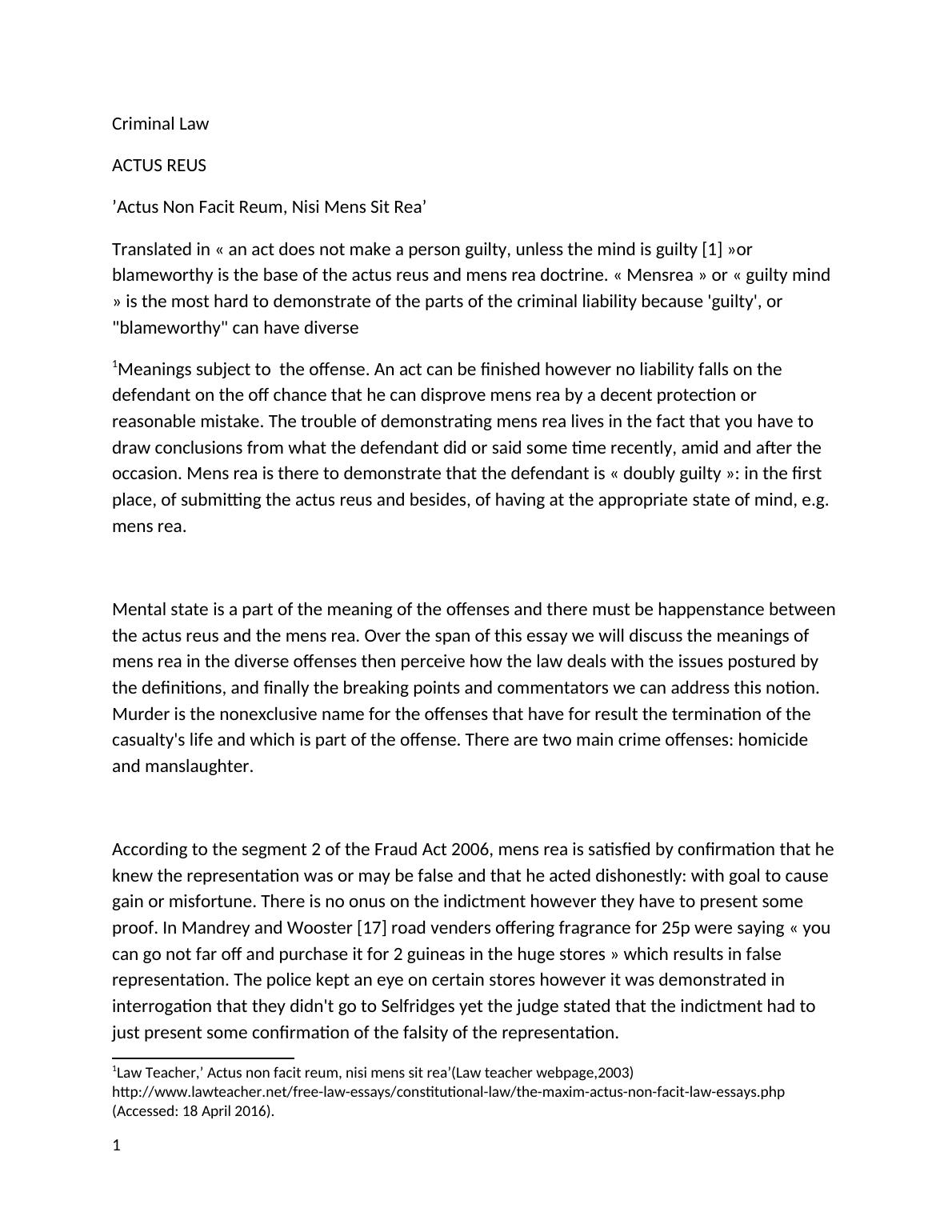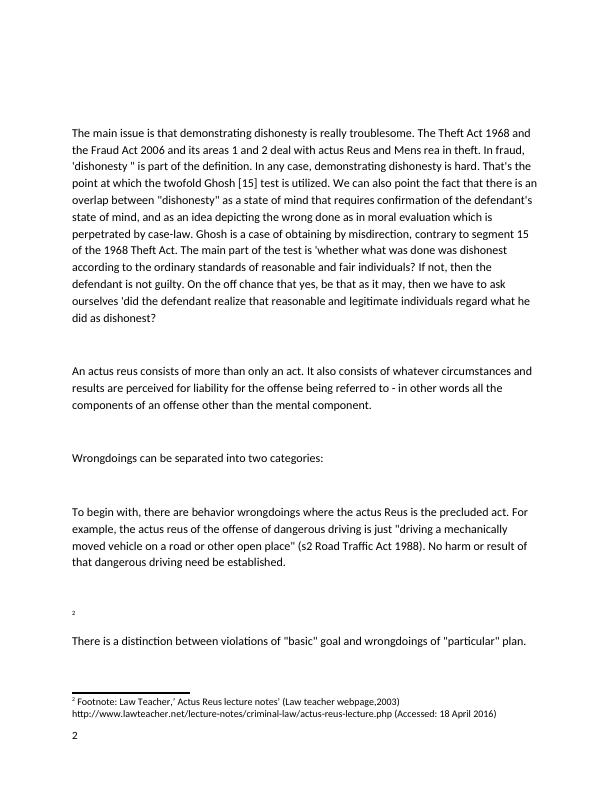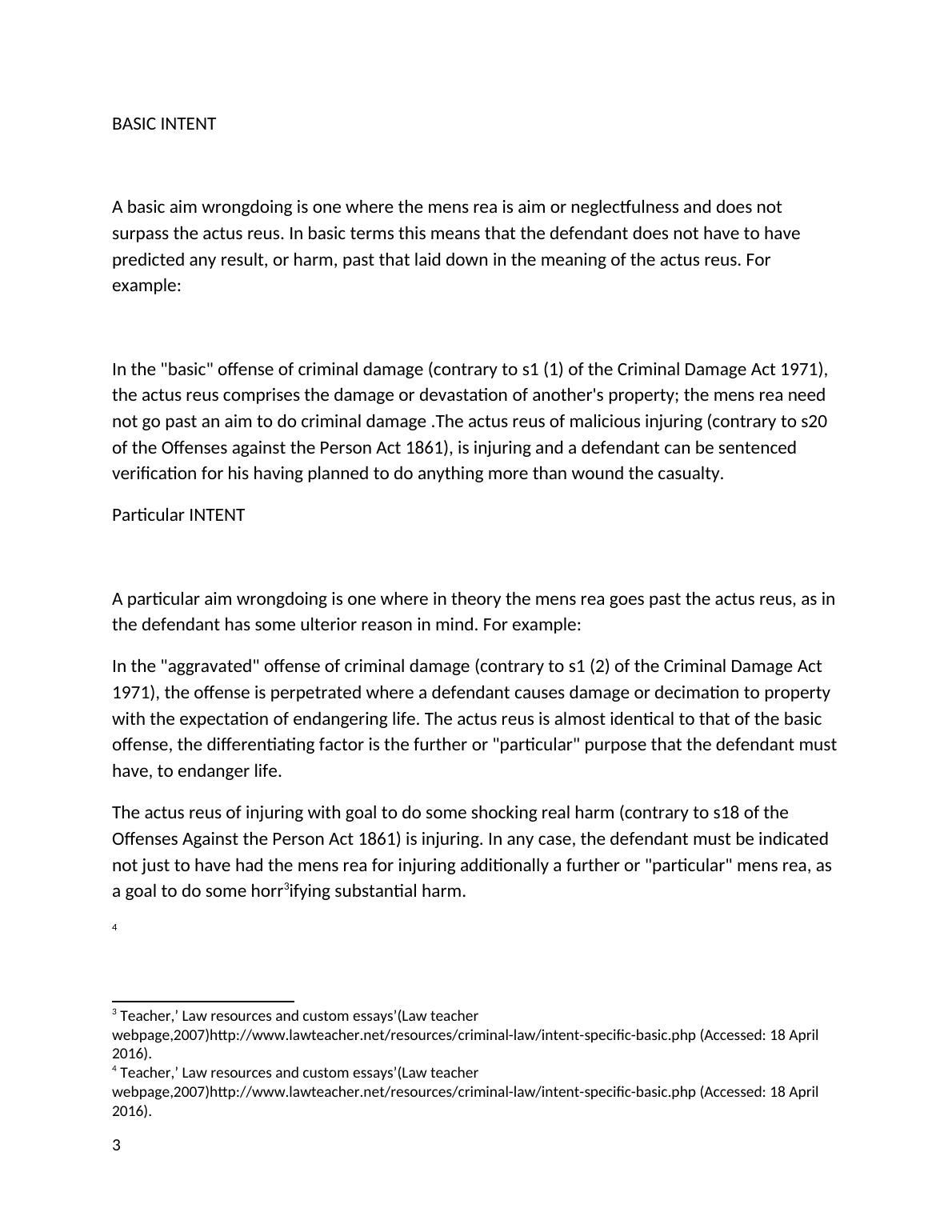Essay on Criminal Law
Added on 2020-02-03
9 Pages2912 Words265 Views
Criminal LawACTUS REUS’Actus Non Facit Reum, Nisi Mens Sit Rea’Translated in « an act does not make a person guilty, unless the mind is guilty [1] »or blameworthy is the base of the actus reus and mens rea doctrine. « Mensrea » or « guilty mind » is the most hard to demonstrate of the parts of the criminal liability because 'guilty', or "blameworthy" can have diverse 1Meanings subject to the offense. An act can be finished however no liability falls on the defendant on the off chance that he can disprove mens rea by a decent protection or reasonable mistake. The trouble of demonstrating mens rea lives in the fact that you have to draw conclusions from what the defendant did or said some time recently, amid and after the occasion. Mens rea is there to demonstrate that the defendant is « doubly guilty »: in the first place, of submitting the actus reus and besides, of having at the appropriate state of mind, e.g. mens rea. Mental state is a part of the meaning of the offenses and there must be happenstance betweenthe actus reus and the mens rea. Over the span of this essay we will discuss the meanings of mens rea in the diverse offenses then perceive how the law deals with the issues postured by the definitions, and finally the breaking points and commentators we can address this notion. Murder is the nonexclusive name for the offenses that have for result the termination of the casualty's life and which is part of the offense. There are two main crime offenses: homicide and manslaughter. According to the segment 2 of the Fraud Act 2006, mens rea is satisfied by confirmation that he knew the representation was or may be false and that he acted dishonestly: with goal to cause gain or misfortune. There is no onus on the indictment however they have to present some proof. In Mandrey and Wooster [17] road venders offering fragrance for 25p were saying « you can go not far off and purchase it for 2 guineas in the huge stores » which results in false representation. The police kept an eye on certain stores however it was demonstrated in interrogation that they didn't go to Selfridges yet the judge stated that the indictment had to just present some confirmation of the falsity of the representation. 1Law Teacher,’ Actus non facit reum, nisi mens sit rea’(Law teacher webpage,2003) http://www.lawteacher.net/free-law-essays/constitutional-law/the-maxim-actus-non-facit-law-essays.php (Accessed: 18 April 2016). 1

The main issue is that demonstrating dishonesty is really troublesome. The Theft Act 1968 and the Fraud Act 2006 and its areas 1 and 2 deal with actus Reus and Mens rea in theft. In fraud, 'dishonesty " is part of the definition. In any case, demonstrating dishonesty is hard. That's the point at which the twofold Ghosh [15] test is utilized. We can also point the fact that there is anoverlap between "dishonesty" as a state of mind that requires confirmation of the defendant's state of mind, and as an idea depicting the wrong done as in moral evaluation which is perpetrated by case-law. Ghosh is a case of obtaining by misdirection, contrary to segment 15 of the 1968 Theft Act. The main part of the test is 'whether what was done was dishonest according to the ordinary standards of reasonable and fair individuals? If not, then the defendant is not guilty. On the off chance that yes, be that as it may, then we have to ask ourselves 'did the defendant realize that reasonable and legitimate individuals regard what he did as dishonest? An actus reus consists of more than only an act. It also consists of whatever circumstances and results are perceived for liability for the offense being referred to - in other words all the components of an offense other than the mental component. Wrongdoings can be separated into two categories: To begin with, there are behavior wrongdoings where the actus Reus is the precluded act. For example, the actus reus of the offense of dangerous driving is just "driving a mechanically moved vehicle on a road or other open place" (s2 Road Traffic Act 1988). No harm or result of that dangerous driving need be established. 2There is a distinction between violations of "basic" goal and wrongdoings of "particular" plan. 2 Footnote: Law Teacher,’ Actus Reus lecture notes’ (Law teacher webpage,2003) http://www.lawteacher.net/lecture-notes/criminal-law/actus-reus-lecture.php (Accessed: 18 April 2016)2

BASIC INTENT A basic aim wrongdoing is one where the mens rea is aim or neglectfulness and does not surpass the actus reus. In basic terms this means that the defendant does not have to have predicted any result, or harm, past that laid down in the meaning of the actus reus. For example: In the "basic" offense of criminal damage (contrary to s1 (1) of the Criminal Damage Act 1971), the actus reus comprises the damage or devastation of another's property; the mens rea need not go past an aim to do criminal damage .The actus reus of malicious injuring (contrary to s20 of the Offenses against the Person Act 1861), is injuring and a defendant can be sentenced verification for his having planned to do anything more than wound the casualty.Particular INTENT A particular aim wrongdoing is one where in theory the mens rea goes past the actus reus, as inthe defendant has some ulterior reason in mind. For example: In the "aggravated" offense of criminal damage (contrary to s1 (2) of the Criminal Damage Act 1971), the offense is perpetrated where a defendant causes damage or decimation to property with the expectation of endangering life. The actus reus is almost identical to that of the basic offense, the differentiating factor is the further or "particular" purpose that the defendant musthave, to endanger life. The actus reus of injuring with goal to do some shocking real harm (contrary to s18 of the Offenses Against the Person Act 1861) is injuring. In any case, the defendant must be indicated not just to have had the mens rea for injuring additionally a further or "particular" mens rea, as a goal to do some horr3ifying substantial harm. 43 Teacher,’ Law resources and custom essays’(Law teacher webpage,2007)http://www.lawteacher.net/resources/criminal-law/intent-specific-basic.php (Accessed: 18 April 2016).4 Teacher,’ Law resources and custom essays’(Law teacher webpage,2007)http://www.lawteacher.net/resources/criminal-law/intent-specific-basic.php (Accessed: 18 April 2016).3

End of preview
Want to access all the pages? Upload your documents or become a member.
Related Documents
Criminal Law Assignment - ACTUS REUSlg...
|10
|2912
|542
Property Offences - Assignmentlg...
|12
|3956
|241
Theories of Criminal Law -lg...
|17
|4620
|17
Criminal Law Assignment - Criminalizing Unlawful Act Manslaughterlg...
|7
|1908
|39
Criminal Law: Elements and Case Analysislg...
|6
|1211
|62
Offenses Against Property PDFlg...
|13
|3835
|346
